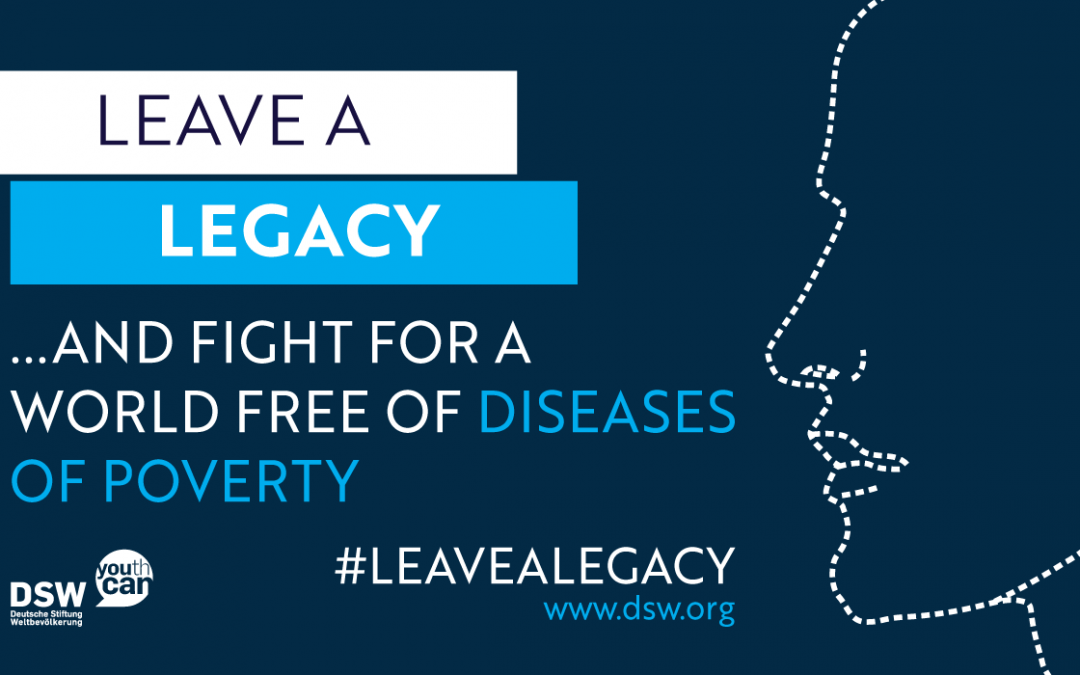Celebrating World TB Day 2018, #LeaveALegacy campaign calls on EU to commit to making Europe leader in global health research
Brussels, March 22, 2018: The #LeaveALegacy campaign is calling on European leaders to take advantage of a once-in-a-decade opportunity to make Europe a leader in global health research, by using the EU’s next multiannual financial framework to fund cutting-edge research to end the epidemic of tuberculosis by 2030.
Cecile Vernant, Head of Deutsche Stiftung Weltbevölkerung’s (DSW) EU office, said: “It’s as simple as this: Europe’s leaders need to think what their legacy is going to be in the minds of millions of Europeans. That legacy could be being responsible for funding a cure for tuberculosis, or a vaccine for HIV – and we think it should be. But, the only way they are going secure a legacy like that is by making a big investment – financially and politically – in global health research in the next decade. That’s why, as they sit down to finalise their plans for the EU’s next multi-year budget in 2018, we want to show them what that legacy could look like, and to show them how they can achieve it.”
The #LeaveALegacy campaign, launched in Brussels on March 22, has spent the week leading up to World TB Day renaming major Brussels streets and monuments in honour of the “legacy” of current EU decision-makers. By doing this, the campaign is spurring them to consider what their legacy could be if the invest in new vaccines, new treatments, and new diagnostic tools that could save millions of lives of people killed every year by diseases like TB, malaria and HIV – diseases that affect over 1 billion people worldwide.
€1 billion mission for global health research
EU leadership in global health research under the next multiannual financial framework means: making sure that global health research and innovation secures the funding to develop the accessible and affordable medical solutions we need to put an end to tuberculosis, and other diseases of poverty – like malaria and HIV & AIDS; committing to a dedicated and ambitiously-funded R&I partnership instrument with Sub-Saharan-Africa, building on the success of existing programmes such as the European and Developing Countries Clinical Trials Partnership (EDCTP); and, ensuring that the EU’s research agenda for the next decade delivers on the Sustainable Development Goals, generating quality employment and research excellence and being open to the world’s best researchers.
Says Cecile Vernant: “Commissioner Moedas says he is committed to mission-driven research for the next research framework. Great! A research and innovation mission aimed at diseases of poverty to the tune of at least €1 billion would usher in a revolution in research – providing a new generation of vaccines, treatments, diagnostic, and other tools that are urgently needed.”
TB remains one of the top 10 causes of death worldwide, and was the biggest infectious disease killer in 2016, responsible for the deaths of 1.7 million people, including 250,000 children. A disproportionate number of these deaths happened in low- and middle-income countries. But, the impact of the disease is not only felt in the developing world. Over 60,000 cases of TB were reported in Europe in 2015, and the incidence of multidrug-resistant TB (MDR-TB) is increasing, including in many European countries.
For more information about #LeaveALegacy, visit: dsw.org/leave-a-legacy
Contact:
Eoghan Walsh
Communications Officer, Deutsche Stiftung Weltbevölkerung (DSW)
eoghan.walsh@dsw.org | www.dsw.org/
Notes to the Editor
- Deutsche Stiftung Weltbevölkerung (DSW) is a global development organisation that focuses on the needs and potential of the largest youth generation in history. We are committed to creating demand for and access to health information, services, supplies, and economic empowerment for youth. We achieve this by engaging in advocacy, capacity development, and reproductive health initiatives, so that young people are empowered to lead healthy and self-determined lives. With our headquarters in Hannover, Germany, DSW operates two liaison offices in Berlin and Brussels, as well as maintaining a strong presence in Ethiopia, Kenya, Tanzania, and Uganda. DSW also advocates for investment in research and innovation to fight poverty-related and neglected tropical diseases.
- According to the most recent GFinder report, EU support for research funding dropped almost 40% to $77m in 2016. The G-finder report attributes this reduction to uneven disbursements by the European Commission to the EU’s main funding instrument in this area, the European and Developing Countries Clinical Trials Partnership (EDCTP). More details here.
- Diseases of poverty, or poverty-related and neglected tropical diseases (PRNDs) is a category that includes, among others, HIV & AIDS, tuberculosis, malaria and 17 neglected tropical diseases identified by the World Health Organisation: Buruli ulcer, Chagas disease, Dengue and Chikungunya, Dracunculiasis (guinea-worm disease), Echinococcosis, Foodborne trematodiases, Human African trypanosomiasis (sleeping sickness), Leishmaniasis, Leprosy (Hansen’s disease), Lymphatic filariasis, Onchocerciasis (river blindness), Rabies, Schistosomiasis, Soil-transmitted helminthiases, Taeniasis/Cysticercosis, Trachoma, Yaws (Endemic treponematoses).


